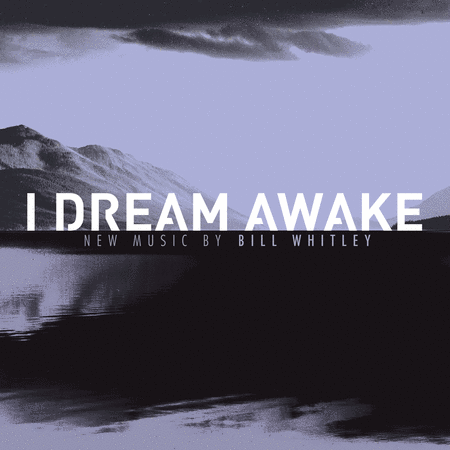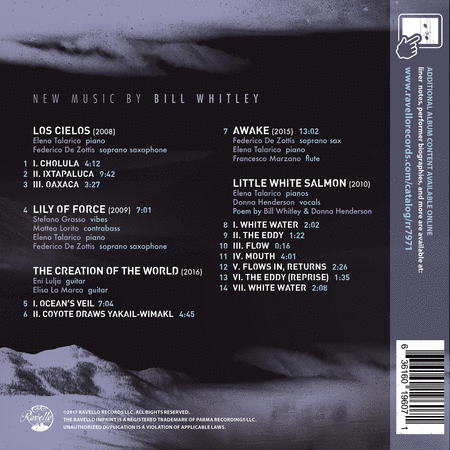Bill Whitley: I Dream Awake
Details
Description
SKU: NX.RR7971
By Donna Henderson Elisa La Marca, Elena Talarico Federico De Zottis, Eni Lulja, Matteo Lorito, and Stefano Grasso. By Bill Whitley. Classical. CD. Naxos #RR7971. Published by Naxos (NX.RR7971).UPC: 636160196071.
I Dream Awake consists of chamber music composed by new PARMA composer Bill Whitley. Whitley's music is characterized by meditative and trance-like qualities inspired by various forms of meditation practice, and, above all, the artistic installations of Alexander Calder. Indeed, Whitley's music seems to be primarily concerned with depicting and embodying experiences, whether they be sensory, natural, spiritual, or human experiences. Lily of Force (for vibraphone, contrabass, piano, and soprano saxophone) takes its name from a Calder mobile of the same name. Whitley credits the piece with solidifying a compositional approach influenced by Calder's work: using the idea of objects suspended in time and space as the basis of a meditative musical language in both content and syntax. Sharing this approach is Los Cielos, written for piano and soprano saxophone. Little White Salmon, a multi-movement cycle for piano and narrator, uses the life cycle of a pacific salmon as an allegory for the human experience. The music, along with the text by Whitley and Donna Henderson, depicts sensory experiences of the salmon--"humming summers' roar and thrum of falls"--as they are passed on to the next generation. The most recently-composed pieces on the album concern spiritual experiences from around the world. Awake (for soprano saxophone, piano, and flute) was commissioned by trIaD in 2015, and expresses an Indian mandala experience. The Creation of the World, a two-movement piece for two guitars, was written in 2016 for South Hill Guitars. The first movement, "Ocean and Her Cloud Daughters," depicts a South-Asian creation story and uses Indian modes and rhythmic cycles. The second movement, "Coyote Draws Yakail-Wimakl," is based on a Chinook creation story in which Coyote, the creator, dances to cure his loneliness and in the process, creates the world. It is structured as a dance, beginning in sadness and culminating in a rapturous fugue in an 11/8 meter. Composer and pianist Bill Whitley's music heavily engages in themes of mysticism and nature, incorporating musical elements as diverse as Gregorian chant, raga music, and progressive rock. He names Brian Eno, John Cage, Laurie Anderson, Meredith Monk, John Luther Adams, and others as major musical influences. Bill Whitley has written music for a variety of instrument groups, ranging from chorus to orchestra to solo electric guitar. His music has been performed in Europe and in the United States. Whitley's music is recorded on Teal Creek Music, and his choral works are published by Trinitas Choral Series. A native of the Northwestern United States, Whitley studied organ, piano, and composition at Gonzaga University. He later earned a Master of Music degree and a Ph.D. in composition at the University of Idaho and the University of Oregon, respectively. Whitley has taught at these universities, as well as at Western Oregon University and the University of Portland. Whitley has studied music with Robert Kyr, David Crumb, Robert Dickow, Dan Bukvich, and Fr. Kevin Waters. Composers with whom he has taken master classes include Lou Harrison, George Crumb, Velio Tormis, John Adams, and John Corigliano.


 Share
Share